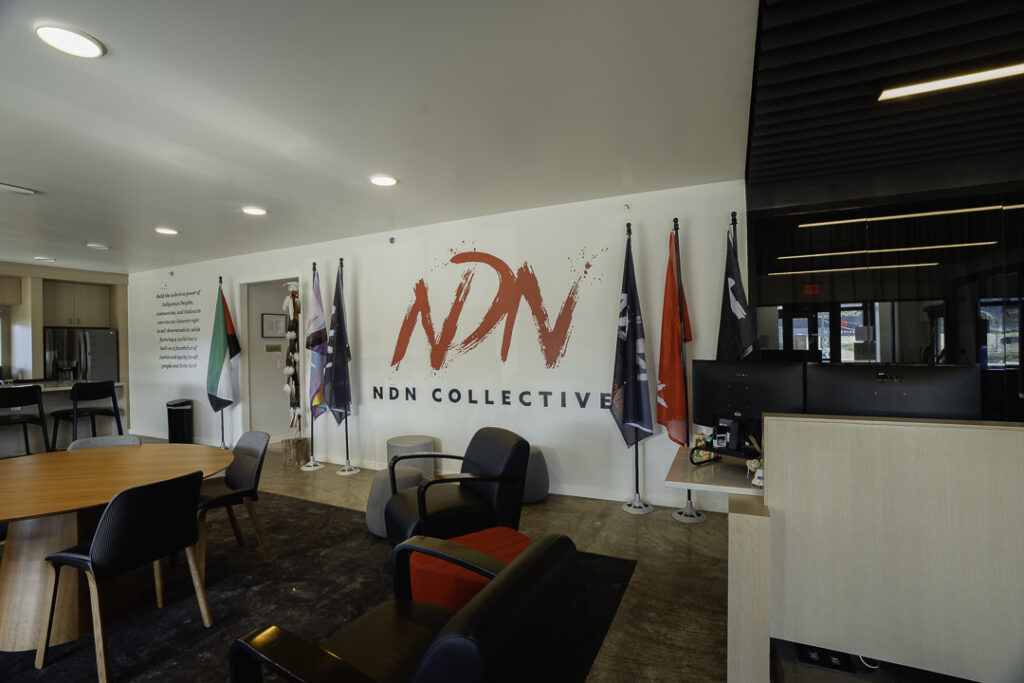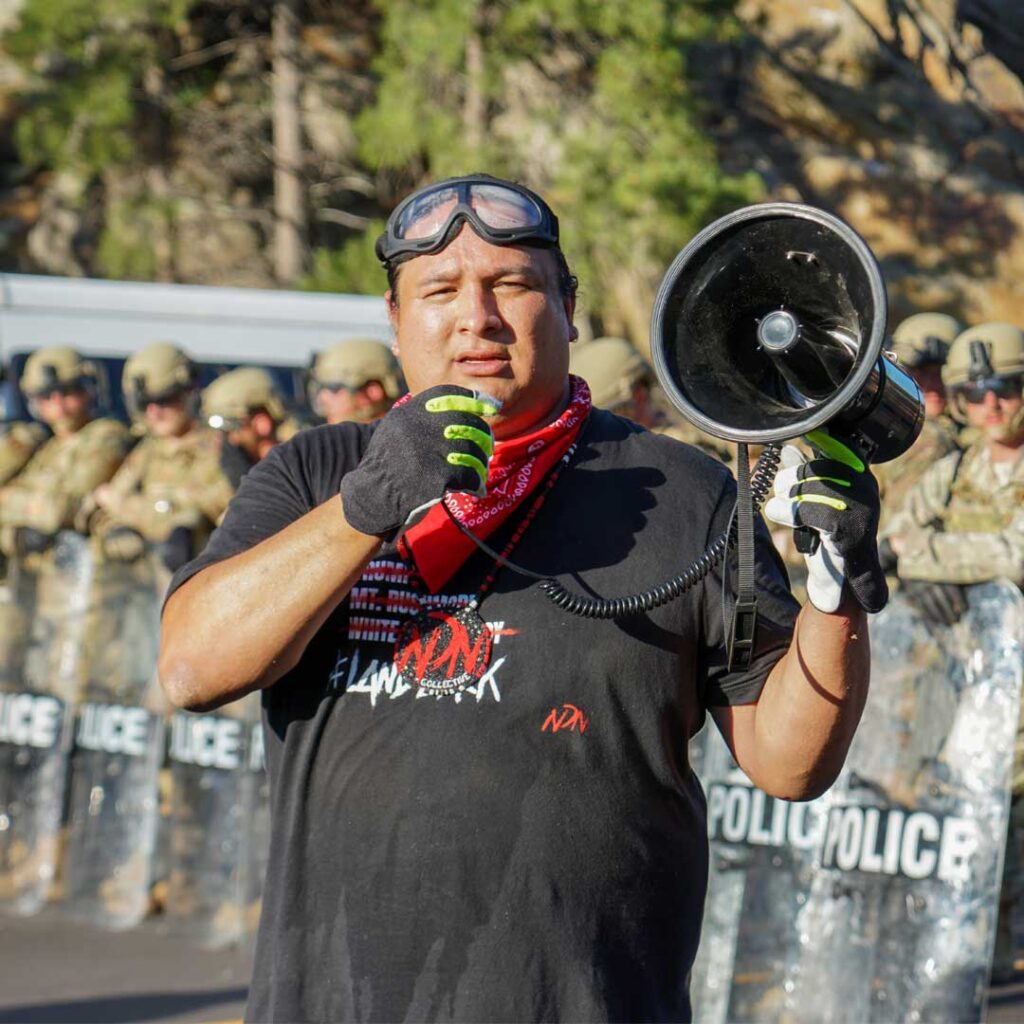Prison abolition itself won’t be on the ballot, but organizers are pushing demands that could change the lives of thousands if adopted by referendum voters or victorious candidates.
By Mansa Musa
November 4, 2024
Source: Real News Network
Policing and prison abolition policy questions have been minimized in the lead-up to the 2024 November election, despite their significance in the last election cycle. Yet these ideas have finally pierced into mainstream debate, and committed prison abolitionists are tirelessly organizing to free incarcerated people, improve conditions within the prison system, and close or prevent the opening of new correctional facilities. Rattling the Bars looks back on the past year of discussions with abolitionists on the stakes and political lessons leading up to November’s presidential election.
Policing and prison abolition policy questions have been minimized in the lead-up to the 2024 November election, despite their significance in the last election cycle. Yet these ideas have finally pierced into mainstream debate, and committed prison abolitionists are tirelessly organizing to free incarcerated people, improve conditions within the prison system, and close or prevent the opening of new correctional facilities. Rattling the Bars looks back on the past year of discussions with abolitionists on the stakes and political lessons leading up to November’s presidential election.
Transcript
Mansa Musa: On Tuesday, this country will be holding elections for the presidency as well as other national, state, and local elections. Nationwide the cry is that the election for presidency is the most important election this nation will be having.
Rattling the Bars and The Real News have been focusing on the impact the elections will have on the prison-industrial complex. More importantly, how does the abolition movement look at the electoral system? What role does it play in the abolishment of the prison-industrial complex? You can hear the views of abolitionists from previously recorded interviews.
Back in May, we covered the Free Her March, where formerly incarcerated women were calling for clemency for 100 women:
Mansa Musa: Okay. We got the Bronx with us today. Why are you here today?
Star: Because we’re here to petition the President, and everybody else on his team, to grant clemency to Michelle West and all the other women who deserve it.
Speaker 8: He told us when we was here four years ago that he was going to free 100 women within 100 days of him being in office. And he has not done any of what he said he was going to do. So we’re here today asking for him to free our women, and free them now.
Star: We are tired of giving the Democrats what they want, and they don’t give us what we need.
Speaker 3: So what do we want?
Star: We want freedom for all women and girls. We want rehabilitation, and alternatives to incarceration.
Speaker 9: We want Michelle West Free!
Miquelle West: I’m Miquelle West, Michelle West’s daughter. My mom was incarcerated when I was ten years old for a drug conspiracy case. She’s serving two life sentences and 15 years.
Speaker 9: I represent the women that want to be free. Let our women be free. Let our women out of [inaudible].
Group: Cut it down!
Speaker 10: [Inaudible].
Group: Cut it down!
Speaker 10: [Inaudible]
Speaker 11: Stop criminalizing us for poverty, stop criminalizing us for how we cope from this trauma that has been put on us historically and continues into this present day. Free my sisters.
Speaker 12: The women get treated badly. The women get raped in jail. All kinds of things. I served federal time, and I know what it’s like to be in there. And I say free women today.
Andrea James: We told them to free those women, and they didn’t do it. They’re sending them to other prisons that, guess what, also are raping our sisters inside of the federal system. So we’ve got a lot of work to do, people.
Laura Whitehorn: The response is to move all the women at once, all of a sudden to just throw them out into places all over the country with no preparation, no bathroom facilities. They’re being, as one of them said, the men who raped them, should, and are, going to prison. And the women are being punished now because they’re saying that the BOP, which can’t control their own staff, has to close the prison because they can’t manage it. And they take the women.
I’ve been walking with different friends of mine who were in Dublin with me. It was not a low-security place at that point. And we’re all having flashbacks of what it was to be transferred in that way, where you’re treated like a sack of laundry, except that you’re chained up. You’re chained at the waist. You can’t use the bathroom for hours, you get no food. They sat on a bus for five hours in the parking lot of the prison.
And then at the end of five hours, they were taken back into the prison. They said, oh, we don’t know where to take you. So the way that they’re being treated and then their families… Some people have children and their families are in the Bay Area. So the children were able to visit their moms in the prison, and now the moms have been sent across the country.
Mansa Musa: All this is the remedy for their abusive behavior. The remedy for their abusive behavior becomes more abusive.
Mansa Musa: Hear Andrea James, founder and executive director of the National Council for incarcerated Women and Girls and Families for Justice as Healing:
Andrea James: We were incarcerated in the federal system. We were in prison with sisters who are never coming home unless their sentences are commuted. So it’s kind of different when you determine what space you’re going to work out of when you haven’t had the full experience of what we’re talking about here.
But if you were like us, if you were women that were incarcerated in the federal system, who were mothers, who were wives, who were aunties, and grandmothers, and sisters, and moms in particular, we have been separated from our children. But some of us had the opportunity to go to prison and come home. So we’re fighting for sisters that, unless we get clemency for them, they’ll never come home.
And we’ve got to really understand that. We’re talking about the liberation of our people, and we want to bring attention to the intentionality of incarceration of our people and the policies that led up to that.
Now, we started our work after, we started organizing in the federal prison for women in Danbury, Connecticut, in 2010, and brought the work-out with us starting in 2011. And then other sisters inside Justine Moore, Virginia Douglas, Big Shay, they started to come home. So it wasn’t rocket science for us, but in the federal prison, you would see this from all over the country, sometimes from different Black communities around the world. And so it wasn’t rocket science for us to stop this work.
But we started in the prison realizing not really totally clear about what clemency was as a tool. But after coming home in 2011, that became crystal clear to us. We met Amy Povah at CAN-DO Clemency. She taught us a lot about clemency as a tool.
And then of course, President Obama, who we got in front of and who centered women and brought us to the White House. But also we should not be going backwards from what President Obama did with clemency.
Mansa Musa: Okay, let’s pick up on right there because… Now, for the benefit of our audience, clemency is a federal mandate, and it’s top heavy in its bureaucracy. Honest you know —
Andrea James: It’s a tool, it’s a privilege bestowed upon. It’s not a mandate, it’s a tool. It’s bestowed upon the president of the United States to grant relief to people from their sentences. And that takes many forms. It could be freedom, immediate freedom, commuting your sentence, meaning it only stops the sentence that you are serving from within a carceral place, a prison.
We decided at some point you can only go so far with what’s happening in Congress right now, who’s controlling Congress, what they’re paying attention to. We fought so hard against the passage of the First Step Act, the way it was presented, because it’s been a big smoke screen.
And we knew when Congress passed First Step that it really wasn’t what we needed. It didn’t address the people who needed to get out. It called out the very people that needed the most relief, and so how could we ever support a bill like that? And we never crossed over in support of it, even though we fought valiantly to try and add retroactivity and other things to the first step.
And then it was put into the hands of the most vile regime, a think tank called the Heritage Foundation, also responsible now for Project 2025, to implement the First Step Act.
And it’s just, we are one of the few, I don’t know if any other organizations have done it, but our legal division, led by our senior council, Catherine Sevcenko, has followed the implementation of the First Step Act. And it’s been just a sham. It’s been a [inaudible], but the PR on it would make anybody think that everybody who’s come, like 30,000 people got released because of the First Step Act. That’s not true. But I digress.
So when we talk about the FIX [Clemency] Act, at some point, yes, we have to weigh in. We need legislators who are directly affected, like Congresswoman Ayanna Pressley, to carry these bills forward for us and to at least put them into existence, knowing that we got a big struggle to get them to go anywhere because the members of Congress were satisfied with the First Step Act.
As abysmal as it is, they weren’t going to center criminal justice reform in any significant way following that for years, we knew that. That’s the path of how things go. We haven’t heard a peep about criminal justice reform other than Trump wanting to bring the death penalty back for drug dealers. We haven’t even heard. It’s not even on the current candidates’ platforms.
And so we had to shift our energy to, and it’s not really a shift, it’s just, what are we picking up now to be present and to make sure that the concept of liberation of our people isn’t left to hope somebody’s going to keep it at the forefront? That’s our job. Nobody’s coming to save us. If nobody gives a shit about our issue, if you’re going to do this work, you have to be consistent in finding ways of staying in the public eye, of showing up, of taking up space, of getting in the street.
And so that’s what we did with the 10th anniversary. We did this 10 years ago in 2014, and that’s how we got the attention, because of the work of Civil Rights lawyer Nkechi Taifa, who brought the National Council and the sisterhood to the attention of President Obama and Valerie Jarrett to say, yo, Prez, we see you. We see you equating. We see you connecting clemency to racial justice. That clemency is racial justice. We see you going into the federal prisons. How could it be that he was the first president of the United States to go to visit a federal prison? How could that be?
Mansa Musa: In August, The Real News’s editor-in-chief Maximillian Alvarez and I talked to David Schultz, a criminal reform and social justice advocate, about how poor and working-class voters navigate an electoral system that doesn’t serve them:
Maximillian Alvarez: So I wanted to ask, as two guys on the front lines of that struggle, what do you think the pundit class covering the elections in mainstream media should learn about the conversations that y’all are having and that folks in these communities are having about the election right now?
David Schultz: Okay, yeah. So I’ll start with that one. So I would say it’s important for individuals. I think being in Washington DC obviously puts us in a unique position because we’re obviously a very political city. I guess it’s different when I go to different areas, different cities. I was just traveling recently, I was in Chicago, and of course it was very political there because we’re getting ready to have the Democratic and national convention. But usually it’s not.
So that puts us in a unique perspective to see how politics really affect our everyday lives. I think you’re a hundred percent correct. I think that individuals that are from smaller, more rural areas really want to see and are more concerned with that direct impact. And so elections for them seem like this far away thing. It’s like they drop something in a box, and if they’re the person they like personality wise really, or who agrees with them on more things than the other, then that’s who they go for.
But they don’t really do their research on the candidates as well as they should to see, really, are they living up to what they’re saying? Are they voting this way even though they’re saying they might be voting this way?
And so I think that it’s important for the pundits, so to speak, to really listen to grassroots individuals because we are the ones that matter. We are the people that they say in the Constitution. We are the ones that make everything one. We’re the working class. So at the end of the day, our vote matters, and they want our vote. So I think it’s imperative that they listen to what our needs and specific asks are.
Mansa Musa: I think on the grassroots, when you’re dealing with a grassroots level, it’s imperative that we educate the people that’s affected because, like you say, people want jobs. People want quality education. People want a safe living environment. People want food quality, cheap food, as far as food prices being so high. People want rent control. They don’t want to be living in squalor and then paying astronomical fees to live there.
So it’s important that we educate… When you’re dealing with the grassroots, it’s important that you educate the population to understand that you have to find a candidate that’s going to represent your interest.
When the Black Panther Party bring Bobby Seale for mayor, they wasn’t running Bobby Seale for mayor to try to get Bobby Seale to be the mayor. They was educating people about how, like Dave said earlier, where the monies come from, how the monies are allocated, and how you can have a voice in monies being allocated to your neighborhood, to clean up your neighborhood, to have the trash collected. How monies could be allocated towards medical or universal healthcare for everyone.
So when I look at it from the grassroots level, I’m always in my mind… My mind is always in this area, educating the people about the electoral process, educating the people about, okay, if you get involved with this process, then make sure you have a candidate that’s going to represent your interest because the candidate is going to come and say what they think you want to hear. They’re going to put on all kinds of activities to motivate your interest.
But when it does settle and they leave, trash hasn’t been collected. It’s high unemployment rate in your neighborhood, housing, you live in squalor. You’re not safe, and your children being targeted because you’re not safe.
So when I look at it from the perspective, I look at it from a perspective that it is incoming from me and people that’s in that space to educate the people on the budget, educate the people on the electoral process, educate the people on how to go about vetting accounts.
Like you say, candidates have listening sessions. So when a candidate have a listening session, then it’s coming from people like myself and Dave to get people to come down there and educate the electorate, ask questions about, OK. Because if you don’t do what we say you supposed to do, same way we elected you in, we can get the recall and get you out.
David Schultz: Can I just add one quick thing? Can I just say, from a grassroots level, to answer your other question is what the individuals are saying is the basic needs is what they’re struggling with when it comes to housing and especially affordable housing, it doesn’t matter if you’re a returning citizen, if you’re just a working-class individual, that basic need is a struggle that, basically, grassroots individuals are really looking to have fixed this election cycle, and the basic necessity of being able to keep food on their table and be able to feed their kids.
So I know it sounds basic, but that’s what I’ve been hearing a lot of in the community and what they are really focusing on this election cycle.
Mansa Musa: And we recently sat down with Jeronimo Aguilar and John Cannon to talk about Prop. 6 initiative to have removed from California State Constitution its version of the 13th Amendment legalizing slavery:
Mansa Musa: I want you to give us a history lesson on how the code that came to exist that’s legalized slavery in California. Because you made an interesting observation before, and we was talking about it again, how we got this perception of California as being the big Hollywood, Rolls Royce.
Jeronimo Aguilar: Yeah, thank you, Mansa. Yeah, no, you’re right, man. We got this idea of what California is. Not only the palm trees and the Rolls Royce, and it’s always sunny, but also that we’re soft on crime, and that criminals are out able to just do whatever they want out here, and there’s no law and order, and all that kind of stuff.
The reality is, the prison-industrial complex out here is as crooked and oppressive as it is in any state of the union. And so, when you talk about especially this exception clause, and specifically here in California, it’s the exception to involuntary servitude. But like we say, as you can see on my background there, one of our main messaging points is that involuntary servitude is slavery.
Mansa Musa: That’s right.
Jeronimo Aguilar: So, they try to lessen it or give it a fancy name, but the reality is the practice is the same thing, of subjugating human beings to work against their will.
So, when you talk about involuntary servitude in California, the history, like you mentioned, it goes all the way back to when California became a state. So, back in 1849. Remember, this territory here was territory of Mexico up until then. You had the expansionist, I wouldn’t even really call it a war, but an assault on Mexico in 1848, which ended with the Treaty of Guadalupe Hidalgo.
That treaty was not honored. Or like most of the treaties that the US [inaudible] with folks of Indigenous ancestry, them treaties were nothing but opportunities for the forked tongue, as they say, to get what they want.
And so, what happened is the land was taken, and Indigenous folks, Indigenous mixed with Spanish folks, became immigrants overnight. And with that said, what you started seeing was the first Constitution of California in 1849 has that exception clause that we see today. It says that involuntary servitude is prohibited except for punishment for a crime. It’s not that exact wording, but it’s the same exact practice.
And so, that set things up. That set the stage for 1850, you started seeing this. So, this is the year right after it became a state and the constitution was introduced. You see the 1850 Act for the Government and Protection of Indians.
And again, the forked tongue. The way that they named the act, you would think, oh, they’re protecting Indians, when in fact, it was a vagrancy law that they used to criminalize Indigenous people, and subsequently enslave them under the exceptions to involuntary servitude.
And so, I want to add to that. Indigenous peoples were already being enslaved by the Spanish colonial powers. We’ll talk about the mission system. So, the Southwest and California, a lot of it was already built by the enslavement of Indigenous peoples.
When you talk about colonization, and once the Spanish came and that era of terror, and then Mexico getting its independence, and you’ve seen Mexico actually outlaw slavery for a period of time while that practice of servitude was brought back once the US took the land from Mexico.
And so, like I said, from 1849 on, up until now, you’ve seen the consistent criminalization of Indigenous, Brown folks, later, obviously, our African brothers and sisters that were enslaved and brought to this continent, and also that ended up migrating, trying to find free states, trying to find places where they can actually be free from the subjugation of slavery, only to find the same kind of practices happening over here in the Southwest.
And so, following that 1850 Act of Government and Protection of Indians, which actually turned what’s now the LA Federal Courthouse, was a vibrant slave auction. Based on that law, you saw acts like the Greaser Act, which passed in 1855. It’s another vagrancy law. If you look at the actual statute, the statute reads, “Dealing with the issue of those of Spanish and Indian blood.” And so really, you’re talking about folks like me. Chicanos, Mexicans, those that are of Spanish or Latino and Indigenous ancestry.
And I think the point, and the benefit for our audience, I think you well represented the case to how they codified laws —
Jeronimo Aguilar: That’s right.
Mansa Musa: …To make sure that this exception clause could be enacted under any and all circumstances.
John, so now we’re at a place where in terms of y’all organized around the abolishment of slavery, the legal form of slavery as we know it now. Talk about y’all Proposition 6, John.
John Cannon: So, Proposition 6 would actually be reversing Article 1, Section 6 of the California Constitution, which is basically just like the 13th Amendment of the United States.
So, Proposition 6, what it would do right now is give a person autonomy over their own body, give a person choice whether they want to work or not. Because as it is now, you have no choice whether to work or not. So, Proposition 6, it would prioritize rehabilitation over forced labor.
So, what that will look like is, right now as it stands, if you’re inside and you’re working, they assign you a job automatically. And whether you want to do college courses or rehabilitative courses or anything else, you’re not able to, because you’re assigned a job. You don’t get to pick the job. You don’t get to choose if you want a job. If you’re assigned the job, you have to do it.
So, if you did want to, say, take an anger management course, or seek anything to rehabilitate yourself, and that aligns at the same time as your job, you’ll have to go to that job or you’ll be punished for refusing to work.
Whether you have a death in the family, you have to go to work, or you’ll be punished for refusing. And all these cases happened to me while I was incarcerated, and you’re getting punished for refusing to work. You’re losing days off your sentence, you’re losing phone time, you’re losing all type of things if you refuse to work. So, Prop 6 would actually give a person their own choice over their own body, over their own rehabilitation.
Mansa Musa: how do y’all address, or how will y’all address… We know Proposition 6 coming to effect, but we also know that prison has become privatized on multiple levels. The privatization of prison is the food service is private, the commissary is private, the industry is private, the way the clothes is being made. Everybody has got involved in terms of putting themselves in a space where they become a private entity.
How will Proposition 6 address that? Because what’s going to ultimately happen, the slave master ain’t going to give up the slave freely. They’re going to create some type of narrative or create some kind of forceful situation where, oh, if you don’t work, you ain’t going to get no days, and you can come over here and work, and… You see where I’m going there with this?
Jeronimo Aguilar: Yep. Yep.
Mansa Musa: So, did y’all see that? Do y’all see it as a problem? Or have y’all looked at that and be prepared to address it?
Jeronimo Aguilar: No, no doubt, Mansa. I think that this is really the first step for us, because it’s going to be a long road. And those of us that have been incarcerated or have fought against the carceral system, you know that every time you do something, they’re going to figure out a way to retaliate, and to find a way to try to circumvent it, they’re going to try to find a way to basically make whatever you’re doing obsolete so they can continue their practice.
And so on our end, it was a really long and tedious process with the language, but we wanted to make sure was that we weren’t just passing something that was symbolic, that ended up just being, oh, okay. We’re removing some words out of the constitution, we all feel better about ourselves, and people that are incarcerated are going through the same conditions.
Mansa Musa: Yeah. Status quo. Go ahead.
Jeronimo Aguilar: Status quo. Exactly. So, the language in Proposition 6, and what was ACA 8 when we passed it in the legislature to get it on the ballot, actually says that any person that’s incarcerated cannot be punished for refusing a work assignment. Cannot be [crosstalk].
So what that does is, it’s not going to stop CDCR from definitely trying to circumvent things. But what it does is it gives folks a pretty strong legal stance. So, if they do continue to be forced to work and disciplined for refusing to work, they can go to court. And we feel, with the language that we now have in the constitution, which is supposed to be the highest letter of the law, they’re going to have a pretty strong legal stance to stand on when they get to court.






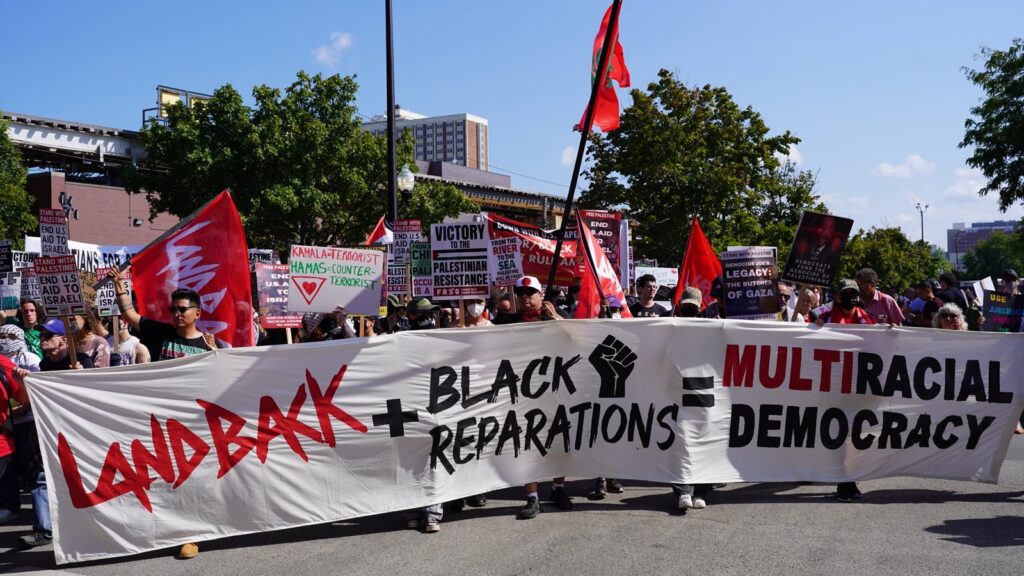
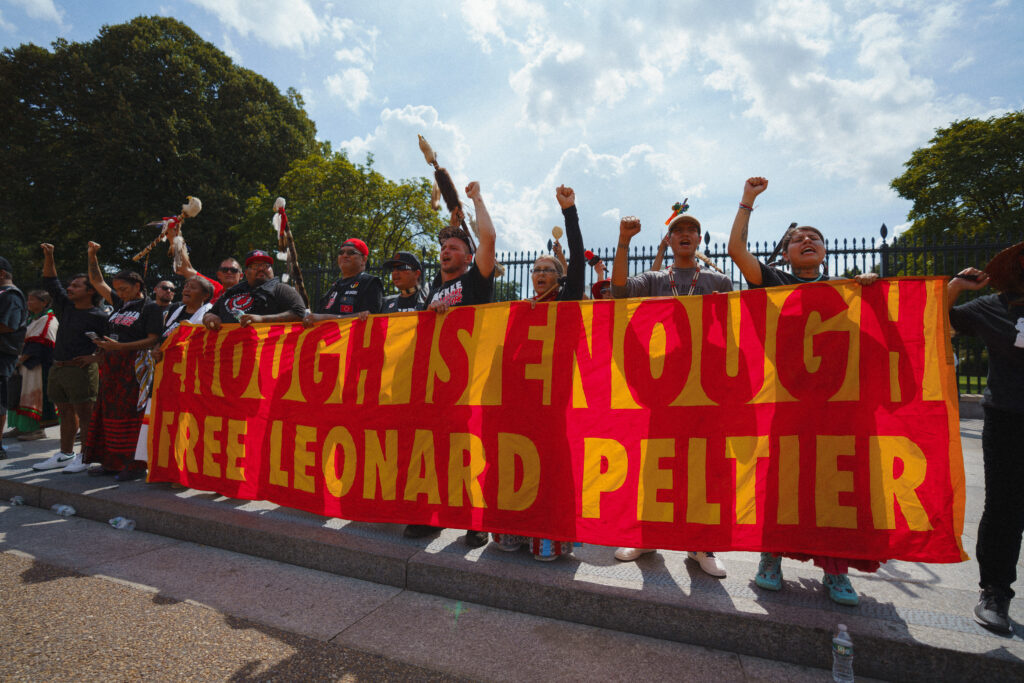
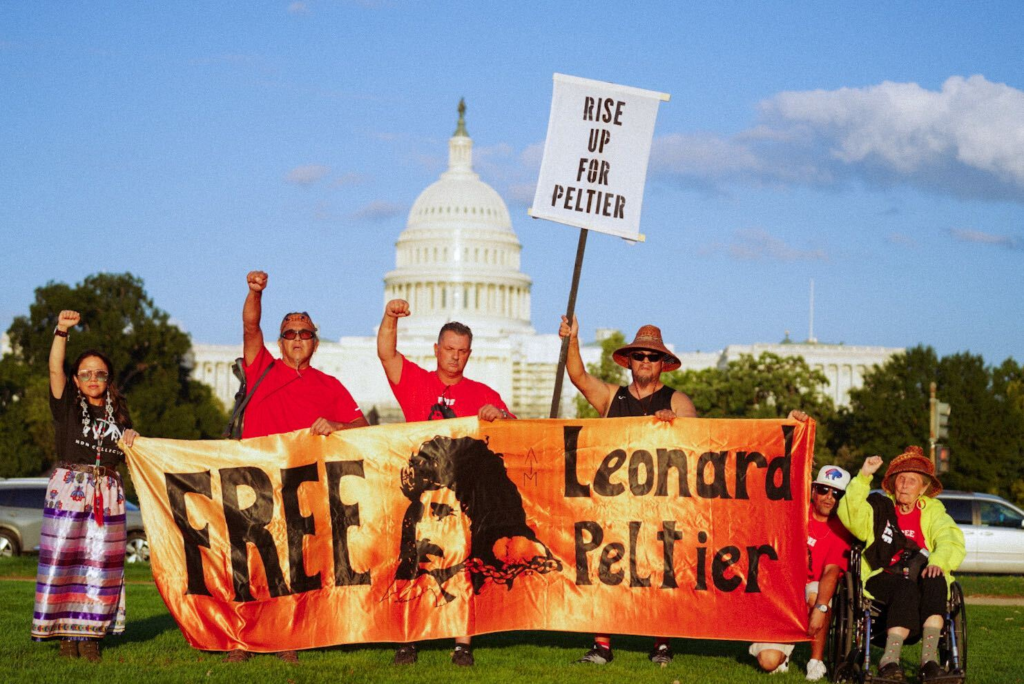
 Photo courtesy of NDN Collective.
Photo courtesy of NDN Collective.